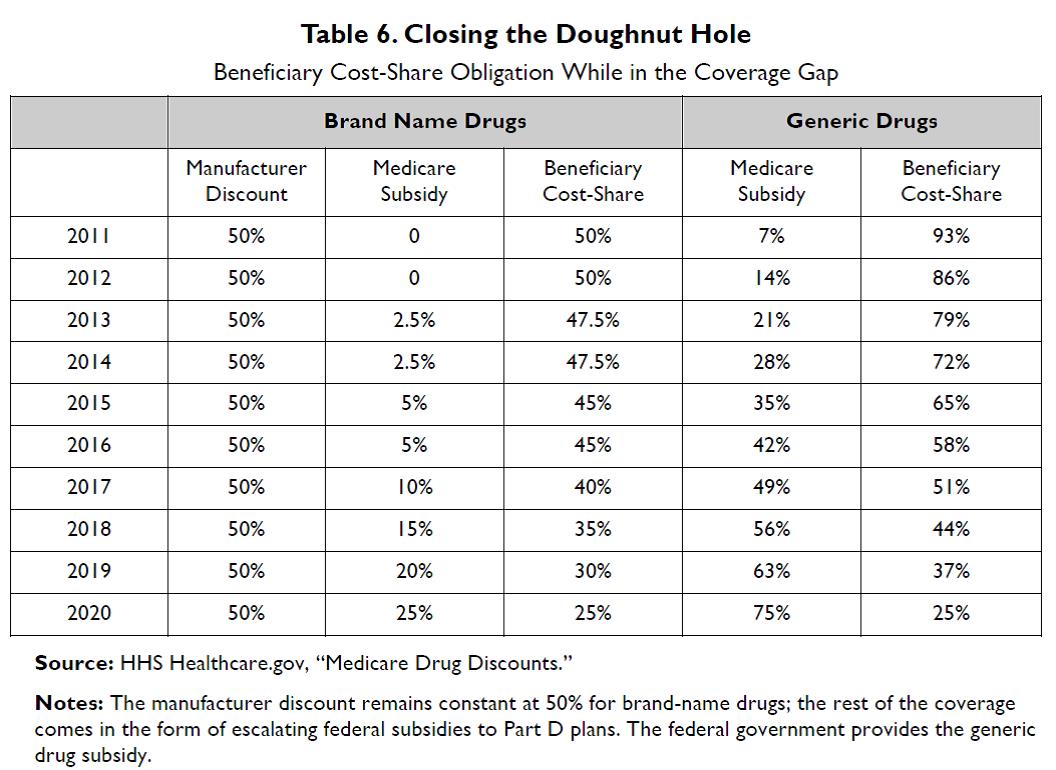The Insurer Bailout Inside the Senate Budget “Deal”
I noted in my prior summary of the Senate budget “deal” that, as with Obamacare itself, Senate leaders wanted to pass the bill so that we can find out what’s in it. And so it proved.
My summary noted that the bill includes a giveaway to seniors, by accelerating the process Obamacare started to close the Part D prescription drug “donut hole.” I also pointed out that this attempt to buy seniors’ votes in the November elections by promising them an extra benefit in 2019 might backfire, because encouraging seniors to choose more expensive brand-name pharmaceuticals over cheaper generics will raise overall Medicare spending and increase premiums.
How the ‘Donut Hole’ Currently Works
The Part D prescription drug benefit Republicans and the George W. Bush administration created in 2003 included a “donut hole” to reduce the bill’s overall costs. During his 2000 presidential campaign, Bush proposed creating a limited drug benefit that provided only catastrophic protection for seniors with very high costs.
But political pressure (to give “benefits” to more seniors) and actuarial concerns (if the federal government covered only catastrophic costs, only very sick people who would incur those costs would enroll, creating an unstable risk pool) prompted Republicans to expand the Part D program. The “donut hole” resulted from these twin goals of providing basic coverage to seniors and catastrophic coverage for those with high medical costs, with the coverage gap or “donut hole” occurring between the end of the former and the start of the latter.
As part of their “rock-solid deal” with the Obama administration, the pharmaceutical industry and Democrats agreed to close the “donut hole” as part of Obamacare. The law required branded drug manufacturers to provide 50 percent discounts for seniors in the “donut hole,” with the federal government gradually increasing its subsidy (provided through Part D insurers) and beneficiaries’ co-insurance gradually declining to 25 percent (the same percentage of costs that beneficiaries pay before reaching the “donut hole”).

The budget “deal” changes the prior law in several ways. First, it reduces the beneficiary co-insurance from 30 percent to 25 percent in 2019, thus filling in the “donut hole.” But in so doing, it also increases the manufacturer’s “discount” from 50 percent to 70 percent, beginning next year.
That second change effectively shifts 20 percent of the cost of filling in the “donut hole” from Medicare, and insurers that offer Medicare drug plans, to drug manufacturers. In other words, it bails out health insurers, who in the future will have to bear very little risk (only 5 percent) of the cost of their beneficiaries’ drug spending.
No Crocodile Tears
That said, drug companies don’t have much reason to cry about the budget “deal” overall. The industry saw the repeal of Obamacare’s Independent Payment Advisory Board (IPAB), an important, albeit flawed, way to control skyrocketing Medicare costs. While Republicans in prior Congresses insisted on paying for legislation repealing IPAB, the party changed its tune at the beginning of this Congress—reportedly at the behest of Big Pharma.
The enacted legislation repeals the IPAB spending controls without a replacement mechanism to contain Medicare costs. This is total derogation of conservatives’ belief in reforming entitlements, and one enacted at the behest of drug company lobbyists.
Moreover, the budget “deal” included another huge win for pharma, by excluding legislation supported on both sides of the aisle to accelerate the approval of lower-cost generic drugs. Pharmaceutical lobbyists claimed the measure would lead to more lawsuits, and those objections meant the provision got left on the proverbial cutting room floor.
More Bailouts Ahead
Given that Kentucky-based health insurer Humana holds a large market share in the Medicare arena—with 5.3 million of the roughly 25 million seniors enrolled in stand-alone drug plans, and more enrollment in Medicare Advantage besides—and that Sen. Mitch McConnell (R-KY) has fought hard, and publicly, on behalf of Humana’s interests in the past, it doesn’t take a rocket scientist to ask whether the Senate majority leader proposed a backroom deal to help his insurer constituents.
Moreover, as we’ve previously reported, Republican leaders want to pass an even bigger bailout, this one for Obamacare, in next month’s omnibus spending agreement. One news outlet reported earlier this week that Republicans’ desire to bail out Obamacare—to “lower” premiums by throwing more of taxpayers’ money at the problem—has risen to such a level “that Democrats don’t feel like they have to push very hard” to ensure its enactment.
Insurer bailouts, measures to raise rather than lower health costs, and an abdication of any pretense of fiscal responsibility or restraint towards our looming entitlement crisis. The Republican Party circa 2018 is truly a pathetic spectacle to behold.
This post was originally published at The Federalist.